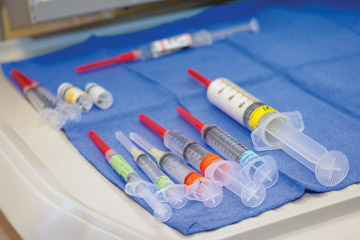Medication errors are all too frequent in the OR. A recent observational study identified an error in 5.3% of all anesthesia medication administrations — roughly 1 of every 20 — with about 80% of those errors deemed preventable. Why do so many medication errors still happen? Perhaps because, unlike all other locations in the hospital, the anesthesia provider is typically the only practitioner involved in determining what medication is needed, and then dispensing and administering that medication.
The problem of administration errors concerned our team so much that we researched all the available literature and organizational guidelines we could find that touch on medication safety. After whittling down all of the tips and findings we uncovered, we were left with 35 unique medication safety recommendations that all surgical facilities should consider in order to assess and correct vulnerabilities. (Our complete paper is at osmag.net/bZ7WgJ.) In this article, we'll briefly cover some of the most important ones.
- Accurate patient information. Before administering medications in the OR, you need a complete, accurate medication reconciliation for the patient. All medications should be entered in a standard format in the patient's chart, and have a single location for recording medications administered across the surgical process, including pre-op and PACU, to avoid errors like double-dosing. Pre-op time outs should include the patient's weight, allergies and medication information such as which antibiotics have been given and when redosing would be needed. Anesthesia providers must be familiar about any patient condition or medication, such as allergies and drug-drug interactions, that could affect the types or dosages of medications to be administered.
- Culture change. One of the most commonly mentioned recommendations in the literature and in guidelines is that every institution needs to have a non-punitive incident reporting system for the reporting and analysis of medication incidents, whether they harmed a patient or not. Medication safety requires a culture change, where there is respect and collaboration rather than judgment; you don't want people to feel badly about mistakes, nor do you want staff members to hesitate to report their colleagues for fear of getting someone else in "trouble" (unless it's a willful violation). Each institution should establish a voluntary, blame-free, non-punitive system for error incident reporting, analysis and intervention. No one begins their day by planning to make mistakes; similarly, it is highly unlikely that a provider who makes an error doesn't care, so they cannot be labeled as "careless." We are all subject to human vulnerabilities, experience fatigue, pressure and distractions, and are at risk of making an unintended error. Incident reporting and analysis should never seek someone to blame, but focus on how the system failed, and how vulnerabilities can be reduced. Create an environment where if somebody makes a mistake, that person feels comfortable reporting it to their superior; the end result should be that the entire team huddles to discuss how to prevent a similar mistake from occurring.
.svg?sfvrsn=be606e78_3)

.svg?sfvrsn=56b2f850_5)